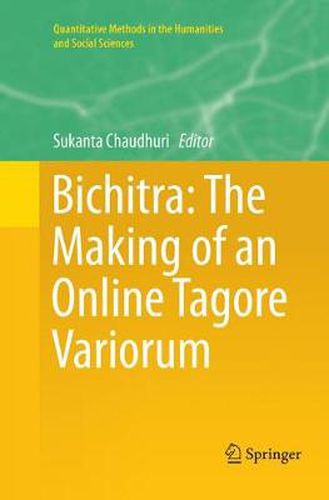Readings Newsletter
Become a Readings Member to make your shopping experience even easier.
Sign in or sign up for free!
You’re not far away from qualifying for FREE standard shipping within Australia
You’ve qualified for FREE standard shipping within Australia
The cart is loading…






This title is printed to order. This book may have been self-published. If so, we cannot guarantee the quality of the content. In the main most books will have gone through the editing process however some may not. We therefore suggest that you be aware of this before ordering this book. If in doubt check either the author or publisher’s details as we are unable to accept any returns unless they are faulty. Please contact us if you have any questions.
This book documents the creation of the Bichitra Online Tagore Variorum, a publicly accessible database of Rabindranath Tagore’s complete works in Bengali and English totaling some 140,000 pages of primary material. Chapters cover innovative aspects of the site, all replicable in other projects: a hyperbibliography; a search engine and hyperconcordance working across the database; and a unique collation program comparing variant texts at three levels. There are also chapters on the special problems of processing manuscripts, and on planning the website. Early chapters take readers through the history of the project, an overview of Tagore’s works, and the Bengali writing system with the challenges of adapting it to electronic form.
The name Bichitra, meaning various in Bengali, alludes both to the great variety of Tagore’s works and to their various stages of composition. Beyond their literary excellence, they are notable for their sheer quantity, the number of variant forms of a great many items, and their afterlife in translation, often the poet’s own. Seldom if ever has the same writer revised his material and recast it across genres on such a scale.
Tagore won the Nobel Prize in 1913.
By its value-added presentation of this range of material, Bichitra can be a model for future databases covering an author’s complete works or other major corpus of texts. It offers vastly expanded access to Tagore’s writings, and enables new kinds of research including computational text analysis. The book of the website shows in technical and human terms how researchers with interests in art, literature and technology can collaborate on cultural informatics projects.
$9.00 standard shipping within Australia
FREE standard shipping within Australia for orders over $100.00
Express & International shipping calculated at checkout
This title is printed to order. This book may have been self-published. If so, we cannot guarantee the quality of the content. In the main most books will have gone through the editing process however some may not. We therefore suggest that you be aware of this before ordering this book. If in doubt check either the author or publisher’s details as we are unable to accept any returns unless they are faulty. Please contact us if you have any questions.
This book documents the creation of the Bichitra Online Tagore Variorum, a publicly accessible database of Rabindranath Tagore’s complete works in Bengali and English totaling some 140,000 pages of primary material. Chapters cover innovative aspects of the site, all replicable in other projects: a hyperbibliography; a search engine and hyperconcordance working across the database; and a unique collation program comparing variant texts at three levels. There are also chapters on the special problems of processing manuscripts, and on planning the website. Early chapters take readers through the history of the project, an overview of Tagore’s works, and the Bengali writing system with the challenges of adapting it to electronic form.
The name Bichitra, meaning various in Bengali, alludes both to the great variety of Tagore’s works and to their various stages of composition. Beyond their literary excellence, they are notable for their sheer quantity, the number of variant forms of a great many items, and their afterlife in translation, often the poet’s own. Seldom if ever has the same writer revised his material and recast it across genres on such a scale.
Tagore won the Nobel Prize in 1913.
By its value-added presentation of this range of material, Bichitra can be a model for future databases covering an author’s complete works or other major corpus of texts. It offers vastly expanded access to Tagore’s writings, and enables new kinds of research including computational text analysis. The book of the website shows in technical and human terms how researchers with interests in art, literature and technology can collaborate on cultural informatics projects.